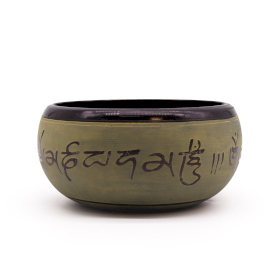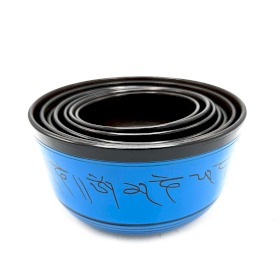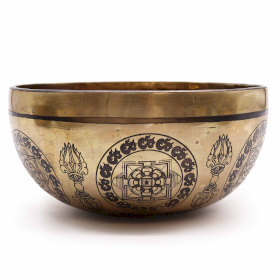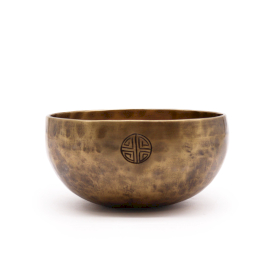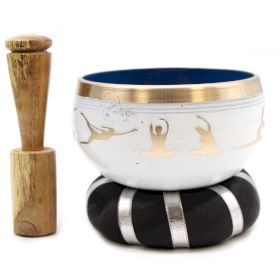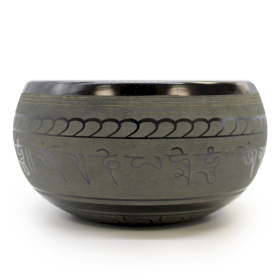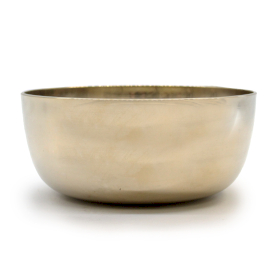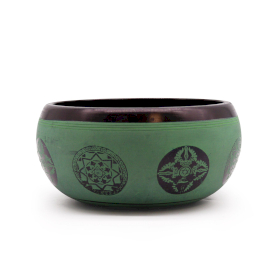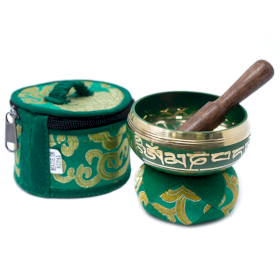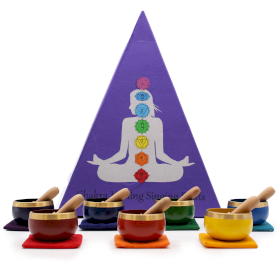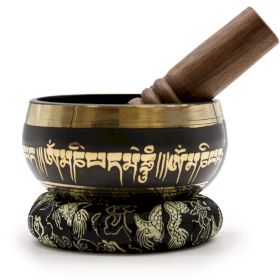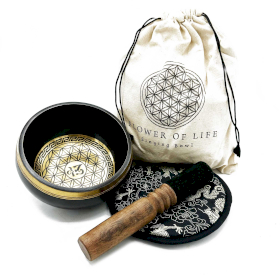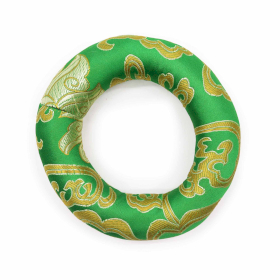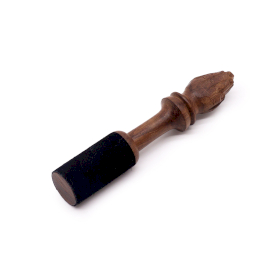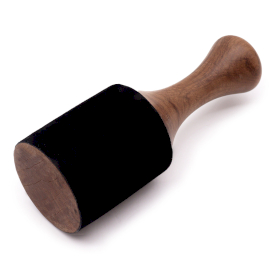Singing Bowls in Sound Therapy — Ancient Vibrations, Modern Healing
Imagine lying down, eyes closed. A deep, grounding hum rolls over you — not just heard but felt. Tension melts. Breath slows. Thoughts quiet. This is the power of sound therapy.
In a world overloaded with screens, schedules, and stress, people are turning to ancient tools for modern calm. From corporate burnout to chronic anxiety, today’s lifestyle demands relief — and sound therapy has surged as a holistic antidote. Practices like mindfulness, yoga, and energy healing are driving interest in sensory rituals that help us reconnect with our bodies and emotions.
At the heart of this wellness wave? The singing bowl. Once a sacred object in Himalayan temples, it has found a new role in wellness studios, therapy rooms, yoga classes — and increasingly, in homes across the UK and Europe. As both a visual statement and a tool for transformation, the singing bowl is fast becoming a must-have in the modern wellness toolkit.
The Ancient Science of Vibration
Singing bowls don’t just make sound — they create vibration. When played, they emit frequencies that ripple through the body like waves in water. And since the human body is over 70% water, this matters. The vibrations pass easily through tissue and bone, creating a full-body resonance that feels both soothing and awakening.
These vibrations interact with our brainwaves, often shifting us from active, stressed beta waves into calmer alpha and theta states — where deep relaxation, insight, and healing can occur. On a physical level, they influence the nervous system, helping to reduce heart rate and blood pressure. On a cellular level, the resonance is thought to aid in energy flow, release of emotional tension, and even cellular repair.
In essence, singing bowls feel like magic — but their effects are grounded in science and the body’s natural response to frequency.
Inside a Sound Therapy Session
So, how does all this vibration and frequency translate into real-life healing? Whether in a tranquil studio or a cosy living room, sound therapy sessions with singing bowls are deeply immersive experiences. The bowls don’t just fill the air with sound — they create a space for release, balance, and transformation.
Depending on the method used, singing bowls can support emotional well-being, energy alignment, and even physical relief. Here's how they're commonly used by practitioners and individuals alike:
Sound Bath
A full-body immersion in sound. Participants lie comfortably while a practitioner plays multiple bowls around them, layering tones and vibrations. Reported benefits include deep calm, mental clarity, emotional release, and better sleep.
Chakra Alignment
Each energy centre in the body (chakra) corresponds with a specific frequency. Practitioners use bowls to target blockages — for example, using a heart-chakra bowl to release grief or open emotional flow.
Bowl-on-Body Therapy
Placing a singing bowl directly on the body allows vibration to penetrate deeply. This method is used for physical tension, energetic clearing, or emotional balancing — often described as a “vibrational massage.”
Solo Meditation
Singing bowls are also perfect for personal use. A few minutes of playing can help with breath awareness, mindfulness, emotional grounding, or intention-setting rituals. Ideal for those seeking a non-verbal, sensory route to presence.
What Size Bowl Do You Need?
Different bowl sizes produce different frequencies — and therefore different effects on the body and mind. Here's a quick guide:
Bowl Size | Frequency | Best For | Chakra Focus |
|---|---|---|---|
Small | High (700–900 Hz) | Clarity, focus | Crown, Third Eye |
Medium | Mid (400–700 Hz) | Emotional release | Heart, Throat |
Large | Deep (100-400 Hz) | Grounding, deep relaxation | Root, Sacral |
Sound with Soul: Why Handmade Matters in Therapy
There’s something intangible about a handmade bowl — the way it sings, resonates, and holds intention. In sound therapy, that soul matters.
Each handmade bowl is a unique piece of craftsmanship, traditionally forged by hand in Nepal or India using a mix of sacred metals. These bowls are often infused with chants, rituals, or blessings during production — giving them a vibrational fingerprint that machines can’t replicate.
Machine-made bowls may look perfect, but they often lack the subtle harmonic overtones and warmth that therapists and practitioners seek. In healing work, the emotional depth of the sound matters just as much as the frequency. Selling handmade bowls is not just offering a product — it’s offering a story, a ritual, and a deeper resonance.
Is There Science Behind It?
While singing bowls may have ancient origins, modern science is beginning to catch up with what many cultures have intuitively known for centuries: sound has healing power.
Clinical studies are increasingly confirming the benefits of sound therapy — particularly with singing bowls. One notable study published in the Journal of Evidence-Based Integrative Medicine found that participants who attended a singing bowl meditation reported significant reductions in tension, anxiety, and negative mood after just one session. Other studies have linked sound-based interventions to improvements in heart rate variability, better sleep, reduced cortisol levels, and enhanced mental clarity.
The mechanism? It lies in how sound interacts with the brain and body. Vibrational frequencies from singing bowls can help shift the brain from active beta states (associated with stress and thinking) to slower alpha and theta states, which are associated with relaxation, creativity, and even healing. This change in brainwave activity supports the nervous system in “downshifting” — moving from a fight-or-flight state into rest and repair.
Even institutions like NASA have explored the effects of vibration on human physiology. In the context of space travel, researchers studied how low-frequency vibrations could help support cellular regeneration and bone health in zero gravity environments — showing that vibrational therapy has far-reaching potential beyond the wellness industry.
As public interest in holistic wellness continues to grow, more healthcare practitioners, therapists, yoga instructors, and wellness coaches are integrating singing bowls into their professional work. Sound healing is now a regular feature at wellness retreats, yoga teacher trainings, meditation centres, and even corporate wellness events.
While the science is still evolving, one thing is clear: sound therapy is gaining credibility — not just as a spiritual or alternative practice, but as a legitimate tool for reducing stress and supporting overall well-being.
How You Can Use Singing Bowls (or Start Offering Sound Therapy)
Singing bowls aren’t just for trained therapists or seasoned meditators. One of their greatest strengths is how accessible and versatile they are — both for personal use and in professional or retail spaces.
For Beginners at Home
If you’re just starting out, using a singing bowl at home can be as simple as striking it gently and letting the sound wash over you. Even a few minutes of daily practice can support mental clarity and emotional balance. Many people use bowls during breathwork, journaling, or evening wind-down routines. Over time, this simple ritual becomes a powerful anchor for mindfulness and calm.
For Therapists and Healers
Massage therapists, yoga instructors, reiki practitioners, and holistic coaches often incorporate singing bowls into their sessions. Whether it's to open and close a class, signal transitions in a meditation, or place the bowl directly on the body for vibration massage, singing bowls elevate the healing experience. Their presence also sets a sacred tone in the room, creating a peaceful and intentional space.
For Retailers and Store Demos
In retail settings, singing bowls are a tactile and sensory product that invites interaction. Demonstrating how to use one in-store — even for a moment — can captivate customers and create memorable experiences. Setting up a small demo table with bowls, mallets, and cushions encourages curiosity and increases dwell time. Sound sells — quite literally.
Smart Add-On Products
To boost your offer and support customer success, consider bundling singing bowls with complementary items such as:
Chakra charts (to help guide frequency selection)
Ring cushions (to display and stabilize the bowl)
Gift boxes or storage pouches
Instruction cards or video tutorials
These thoughtful additions make singing bowls more giftable and approachable, especially for first-time buyers.
Final Notes: The Business of Healing Sounds
Singing bowls are more than a product — they’re a gateway to wellness, presence, and peace. For retailers and wellness spaces, they offer not only high retail margins but also long-term customer value through education, experience, and emotional connection.
In a fast-growing wellness market, singing bowls are a sound investment. Present them with intention, package them with care, and you’re not just selling — you’re helping people find stillness in sound.
